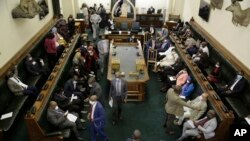The Criminal Law Code Amendment Bill, widely known as the "Patriotic Bill," contains a clause that criminalizes "willfully damaging the sovereignty and national interest of Zimbabwe."
Opposition activists said the law, passed late on Wednesday, was designed to punish citizens, civil society organizations and political adversaries of the ruling ZANU-PF party.
It has raised fears that the government could launch a crackdown on dissent ahead of the general election on Aug. 23, where President Emmerson Mnangagwa will be seeking a second term.
The 80-year-old's main rival is lawyer and pastor Nelson Chamisa, 45, who leads the newly formed Citizens Coalition for Change (CCC).
CCC spokesperson and lawyer, Fadzayi Mahere, described the law as "dangerous" and said it aimed at closing the democratic space ahead of elections.
"ZANU-PF has reduced our great nation into an outpost of tyranny," Mahere told Reuters.
"None of it will work because Zimbabweans go to the polls with one mission - to win Zimbabwe for change. No amount of panicky despotism by ZANU will stand in the way of change whose time has come."
ZANU-PF chief whip Pupurai Togarepi said the Patriotic Act is a reflection of the will of the people as citizens were consulted in public hearings in accordance with the constitutional requirements.
However, many citizens complain that the final legislation rarely incorporates their views.
"The passing of this law that relates to the Patriotic Act was done through due process, and I am so happy that we are where we wanted to be and the people of Zimbabwe were involved," Togarepi told VOA.
Musa Kika, a lawyer and the director of the Zimbabwe Human Rights NGO
Forum, says the law negates whatever intent, commitments
and promises the ruling Zanu PF has been making about reform.
All sorts of civil and political rights that the constitution gives are infringed by this kind of bill. In my estimation this bill is the most draconian that we have seen in
independent Zimbabwe," Kika said.
"Laws like POSA [Public Order and Security Act], AIPPA [Access to Information and Protection of Privacy Act] and the PVO Bill [Private Voluntary Organizations] they come nowhere near the kind of infringements that this bill will bring on our constitution."
Both houses of parliament recently passed another controversial bill, the Private Voluntary Organization Amendment Bill – which would allow the government to designate those NGOs it alleges to be at high risk to terrorism. It would also ban them from engaging in “political activities,” including human rights activities.
But Mnangagwa has yet to sign the bill following wide criticism.
VOA reporter Kudzanai Musengi contributed to this report. Some information came from Reuters.








Forum